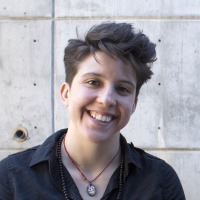
This post was written by Jay Colbert (@spookycolbert), who received a DLF Students & New Professionals Fellowship to attend the 2018 Forum.
Jay Colbert (@SpookyColbert) is the current Resident Librarian at the University of Utah’s J. Willard Marriott Library. Their responsibilities include subject liaison work, reference, and library instruction along with metadata and cataloging duties, primarily for the digital library and digital exhibits.
Their research investigates the relationship between language and power in libraries, particularly in subject access and descriptive cataloging. Jay received their MSLIS from the University of Illinois at Urbana-Champaign and their BA in English from the College of William & Mary. They are also active within the ALCTS CaMMS division and GLBT Round Table of ALA, and OLAC. In their free time, they watch too many movies, practice Buddhism and yoga, and hang out with their bearded dragon.
This year, I was selected as one of the DLF New Professionals Fellows. I was beyond thrilled to be accepted and to attend the DLF Forum. Although I focused my graduate coursework on metadata, it was more geared toward traditional bibliographic description as opposed to online resources. In my current position, I work a lot with our digital library services, I thought it would be prudent to expand my knowledge on digital libraries. I am glad to have attended the DLF Forum to aid in this.
I attended many types of sessions on varying topics, from system migrations to linked data to privacy. One theme through most of the sessions that I wish to highlight is that of recognizing our power as librarians over our patrons and even our coworkers. Most sessions I attended mentioned this theme, either at their focus or implied.
Metadata librarians of all types have a long history of trying to fix the way we describe items so that the language does not replicate oppressive structures. However, simply trying to correct our practices is not enough. As the presentation on indigenous visual culture and subject access in the Decolonizing Vocabularies session stressed, we must work alongside communities and/or consult them when developing our vocabularies and describing items. Through this, we shift our power to those communities.
We do not just hold power over communities. Indeed, as the session on Disrupting Exploitative Labor demonstrated, most of our entry-level positions put new-career librarians at a power disadvantage. This session pointed out how unpaid internships and temporary contracts exploit the labor of those in those positions and contribute to a workplace culture which devalues labor, especially labor done by early-career librarians. I often see job postings for digitization and description that are project based, meaning they end when the project ends. In digital libraries, as this session emphasized, we need to create permanent positions, question and oppose temporary positions, and create workplace atmospheres where new librarians, especially those who belong to marginalized groups, feel welcome.
Although our field is a highly technical one, the sessions at the DLF Forum reminded us that we do this for people, and that our work therefore does not exist in a vacuum made of ones and zeros.
I feel that the keynote speaker, Anasuya Sengupta, tied this theme of power in digital libraries together. In her keynote, she spoke of the unifying power of digital libraries and how they can empower marginalized peoples. However, they can also reinforce hegemonies; most of the internet (including Wikipedia) is in English.
As digital library workers, it is our job to help make the internet and the information in it accessible to all people. At the 2018 DLF Forum, many sessions stressed this aspect of our job, challenging us to be better. Although our field is a highly technical one, the sessions at the DLF Forum reminded us that we do this for people, and that our work therefore does not exist in a vacuum made of ones and zeros.
Want to know more about the DLF Forum Fellowship Program? Check out last year’s call for applications.
If you’d like to get involved with the scholarship committee for the 2019 Forum (October 13-16, 2019 in Tampa, FL), sign up to join the Planning Committee now! More information about 2019 fellowships will be posted in late spring.
